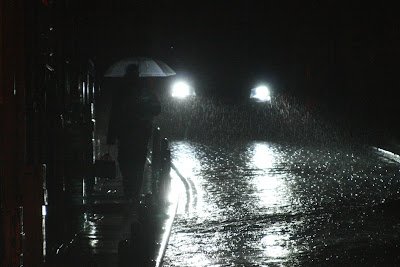 |
| (Photo by Rob Pieh) |
Monday, October 18, 2010
Dupnisa Cave
Thursday, October 14, 2010
Baba Zula
Last night I went to hear Baba Zula, Turkey's top psychedelic Electro-Anatolian Bağalama band... It was interesting. The band, especially the lead player, was dressed as if they what looked like old Janissary "Mehter" costumes that had accumulated 100 years of dust in the attic of the musician's aunt's house. The highlight of the night was a song called "Pırasa," meaning "leek." The performance culminated in a single leek suspended from a fishing line that was lowered down to the stage. As it dangled, the band danced around it in various levels of seemingly drug-induced delirium. They sung directly to the leek, and perhaps the leek was singing back to them in a sense as well. While I didn't have the state-of-mind to understand what the leek was saying to them, luckily they translated through music. The song climaxed as the lead-player began to violently strike his instrument with the leek. The stage went dark, except for a spotlight on the leek, which was then raised back to the ceiling.
Saturday, October 9, 2010
Sunday, September 26, 2010
Mushrooms in Hurriyet...
An article in today's Hurriyet says...
"Mushrooms that decorate the woods with their cute umbrella appearances are an indispensable dish for many, but the characteristics of those that proliferate in Turkey’s forests are widely unknown...'A poisonous mushroom called ‘Sour Mehmet,’ resembling a sheep’s belly, is often sold in bazaars,' said Barutçiyan."
Friday, September 24, 2010
Tuesday, September 21, 2010
Donkeys In Today's Hurriyet
A gem quoted from a Turkish English-Language newspaper...
Free Donkeys on Shores of Aegean
The offspring of doneys left by Greeks who left Turkey after the Balkan Wars in 1912 and 1913 number in the thousands today and are roaming free. During the Greek exodus, most migrants traveled to Greece by sea after transporting all their goods to shore by donkey. The donkeys, however, were not taken on the journey. According to elderly locals the Ottoman Government tried to look after the donkeys and ordered the district governors to gather them together. "They first gathered them at castle constellations or in the village countryside and tried to take care of them," said a local elder called Uncle Cevdet. "There were people who wanted to take ownership of some of the donkeys but that was a difficult job. The donkeys did not have saddles or leashes and you couldn't make them move even by holding them by their ears. They are stubborn animals," Cevdet said, adding some people even died from kicks while trying to move the donkeys and when they brayed in chorus the sound was unbearable. Eventually, the donkeys moved to districts like Çeşme, Ayvalık.
Tuesday, September 14, 2010
Turkish Visa: In 15 easy steps!
Getting a Turkish Educational Visa in 15 easy steps. . . a true account.
- Goto the Turkish Embassy in New York at 10:00 am (a reasonable time). Assume that credit cards aren't accepted so bring a check.
- Learn the the consular office is only open from something like 2:30 to 4:30 pm, leading to a 3 hours Starbucks excursion.
- Return to the Embassy and wait on line for 45 minutes.
- Learn that the Turkish government only accepts cash. . .
- Run to a Chase ATM
- Return, wait on line. . . hand over your passport.
- Leave New York City, with no opportunities to return for 3 months. . .
- Wait 2 weeks. . .
- Receive an email from a Turkish consular officer stating that you've applied for your visa too early and that your should "apply again at the last minute"
- Argue to be allowed to mail the passport back in a month or so.
- Return to the consular office 3 months later.
- Wait for consular officer to write a hand-written receipt on a blank sheet of printer paper.
- Sign on the hand-written "X__________"
- Receive Visa...
- Depart for Turkey!
Subscribe to:
Posts (Atom)















